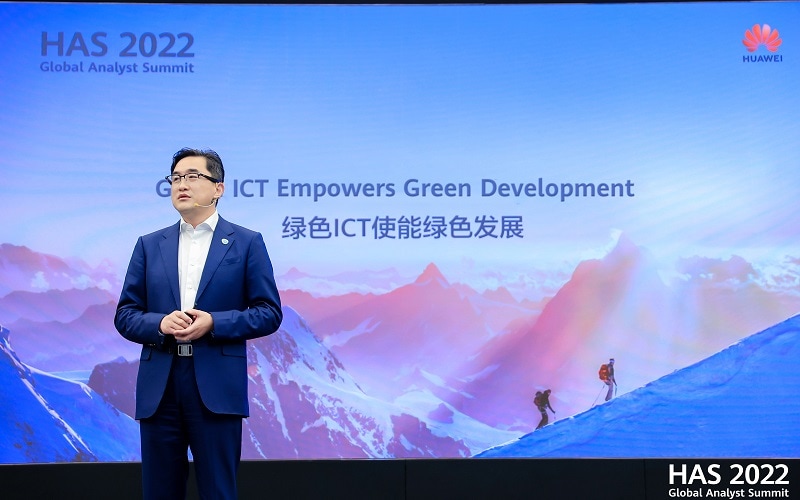[Shenzhen, China, April 27, 2022] Huawei released the Green Development 2030 report today at the Huawei Global Analyst Summit 2022 (HAS 2022), which systematically outlines how ICT can empower green development. It was released by Kevin Zhang, CMO of Huawei’s ICT Infrastructure Business, at the Green ICT Empowers Green Development forum which was attended by analysts, experts, scholars, and journalists from around the world.
 Kevin Zhang, CMO of Huawei’s ICT Infrastructure Business, releasing the Green Development 2030 report at HAS 2022
Kevin Zhang, CMO of Huawei’s ICT Infrastructure Business, releasing the Green Development 2030 report at HAS 2022
The Green Development 2030 is the latest in a series of Intelligent World 2030 reports that systematically present Huawei’s outlook on the future, and provide a general blueprint for the ICT industry’s development and how it can contribute to other industries. Green Development 2030 has been developed based on the industry insights and best practices Huawei has gathered over years, and supplemented by the input from nearly 100 industry experts and more than 30 third-party organizations including policy makers, associations, think tanks, and enterprises.
The Green Development 2030 report focuses on how digitalization and decarbonization can drive green development, as well as potential applications of green ICT in key industries by 2030. It also explains the three main pathways that future ICT innovation should pursue to empower green development: improving the energy efficiency of digital infrastructure, increasing the share of renewables in electricity generation, and enabling green industries. This will provide insights for green development efforts worldwide.
During his speech at the forum, Zhang said, “Digitalization and decarbonization reinforce each other and jointly drive green development. ICT will be key to both digitalization and decarbonization processes. As a leader in ICT innovation, Huawei is committed to building green ICT infrastructure, accelerating the development of renewable energy, and improving energy savings and emission reductions in a wide range of industries. This is how we hope to promote sustainable development within our society at large.”
The President of Huawei’s SingleRAN Product Line Aaron Jiang also spoke at the forum, explaining Huawei’s practices to build networks with both optimal performance and high energy efficiency, saying, “Huawei’s green 5G solutions are using intelligent technologies to improve the energy efficiency of base stations, and reduce energy consumption across whole networks.”
The forum was attended by a number of industry representatives who spoke on their organizations’ own roadmaps and best practices for empowering green development with digital technologies, including Global Enabling Sustainability Initiative (GeSI) CEO Luis Neves, Deputy General Manager of China Mobile’s Planning & Construction Department Li Zhongyan, Deputy General Manager of State Grid Yancheng Power Supply Company Wang Guoping, and Head of ICT Security at BYD’s Information Center Luo Xiaoping.
GeSI’s Luis Neves said, “ICT has the potential to enable a 20% reduction of global CO2e emissions by 2030, hold emissions at 2015 levels, and effectively decouple economic growth from emissions growth. This means that the impact of ICT solutions is nearly 10 times higher than ICT’s expected footprint in 2030. At present, the potential of digital technologies is far from being fully harnessed. Those potentials can only be achieved through collective action. This is why GeSI is calling for the ICT Industry to work together through the Digital with Purpose Movement.”
Closing out his speech, Kevin Zhang reiterated Huawei’s commitment to collaboration and to using green ICT to empower green development, saying that Huawei would work to provide products with higher energy efficiency and lower energy consumption, use bits to manage watts, and shift from carbon footprint to carbon handprint, to drive the green development for the whole world.
For more details, please download the Green Development 2030 report at https://www.huawei.com/en/giv/green-development-2030
PR Archives: Latest, By Company, By Date